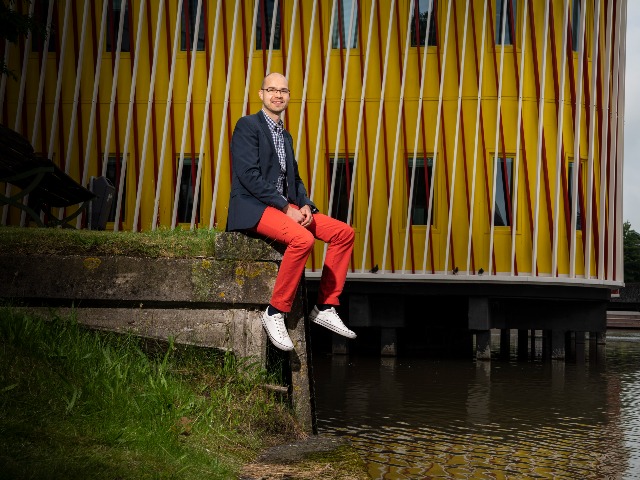Energy transition: organizational knowledge for effective multi-stakeholder collaboration can be a key ingredient
| Date: | 09 December 2021 |

At the end of last year, dr Björn Mitzinneck, dr Tom Boot and dr Christiaan van der Kwaak received a Veni grant from the Dutch Research Council ( NWO ) worth up to €250,000. The grants provide the laureates with the opportunity to further develop their own research projects during a period of three years. The VENI grants are aimed at excellent researchers who have recently obtained their doctorate. Björn Mitzinneck introduces himselfs and tells more about his research.
“After graduating from Cornell University, I have joined the Innovation Management and Strategy Department as an assistant professor. My research focuses on the organizational challenges involved in transitioning our economies and businesses to a more sustainable future. This includes work on novel organizing approaches as well as green innovation activities. It is great to see how FEB with its strategic research themes is embracing such research directions and I am excited to be part of this inspiring scholarly community.
My VENI research
Scholars, governments, and the public increasingly recognize the energy transition as a pressing societal challenge. Yet, while more sustainable technologies are available, their adoption is often hampered by public resistance. To abate such resistance and facilitate sustainable technology adoption, it is necessary to ensure value creation for all stakeholders affected by the transition. Participatory approaches – like community energy projects – are gaining traction, but we need to better understand the organizational models that allow such initiatives to integrate all necessary stakeholders. My Veni project will study recent developments both in the Netherlands and neighboring countries from an organizational perspective to advance our conceptual understanding inductively and offer evidence-based tools to practitioners in the field.
Conceptually, the Veni project speaks to research on hybrid-organizing, the management of heterogeneous often conflicting aims in an organization that conventionally would not be combined. It is concerned with organizational structures and practices to safeguard multidimensional value creation (Besharov, & Mitzinneck, 2020). Existing hybridity management approaches rely on authority relationships typical of well-circumscribed organizations with comparable organizational members (Mitzinneck & Besharov, 2019). Yet, for the socio-technical changes required by the energy transition, we need flexible, adaptive collaboration between multiple stakeholders, including municipalities, companies, and citizens. We thus lack an understanding of more participatory forms of hybrid-organizing between diverse stakeholders with divergent interests.
To make it more concrete, imagine you are asked as a home-owner to switch to a local heating grid instead of the national gas network. After the switch you are beholden to the operators of this local grid. How is price stability achieved in the absence of a regular market mechanism between competing energy providers? How can you have a say as in where the energy is sourced from, analog to your option to choose between domestic or foreign fossil gas, CO2 compensated gas, or other biogas providers regionally or nationally? On the flipside, how can businesses be convinced to invest in local heating grids if municipalities reserve rights to set rate caps? As a municipality, how do you control costs but also win private partners or ensure energy equity between more and less affluent neighborhoods in your community? How do you make all voices heard and safeguard procedural justice? These are some of the questions multi-stakeholder collaborations are faced with as they strive to create value for all involved. They are questions, extant hybrid-organizing theory is only partially equipped to answer.
Through a comparative case study of sustainable district-heating initiatives, I seek to address this research need. Such initiatives are emblematic for collaboration between very different stakeholders and thus offer a revelatory context for theory-building research. My work will help develop a new concept of collaborative hybrid-organizing relevant for many grand challenges, such as climate change adaptation.
Societal relevance
The Dutch National Research Agenda highlights our need to better understand how the energy transition can be organized. National newspapers like de Volkskrant have just recently noted, for example, how the many pilot projects under the umbrella of “aardgasvrije wijken” (fossil gas-free neighborhoods) have had limited success so far. By early 2021, a mere 206 households had actually been disconnected from fossil gas. If we are to meet both national and European climate goals, we need to speed up such transition processes, especially in heating as a major share of total energy consumption. Organizational knowledge for effective multi-stakeholder collaboration can be a key ingredient in achieving just that.
Collaborative hybrid-organizing models can also be effective in addressing similarly positioned societal challenges. Insights generated in the Veni project may also inform organizing challenges in local transitions within the broader vision of a “Participatiesamenleving” (participant society), such as community (health) care or community broad-band and mobility initiatives for instance. Especially in the less-densely populated northern Netherlands this may be of considerable relevance. By working with partners from practice, I thus hope that this research will also translate into social impact in the region.”
Key publications
Besharov, M. & Mitzinneck, B. [Eds.] (2020). Organizational Hybridity: Perspectives, Processes, Contexts, Research in the Sociology of Organizations, vol. 69
Mitzinneck, B. & Besharov, M. (2019). Managing Value Tensions in Collective Social Entrepreneurship: The Role of Temporal, Structural, and Collaborative Compromise, Journal of Business Ethics, 159(2): 381-400 https://link.springer.com/(...)07/s10551-018-4048-2

